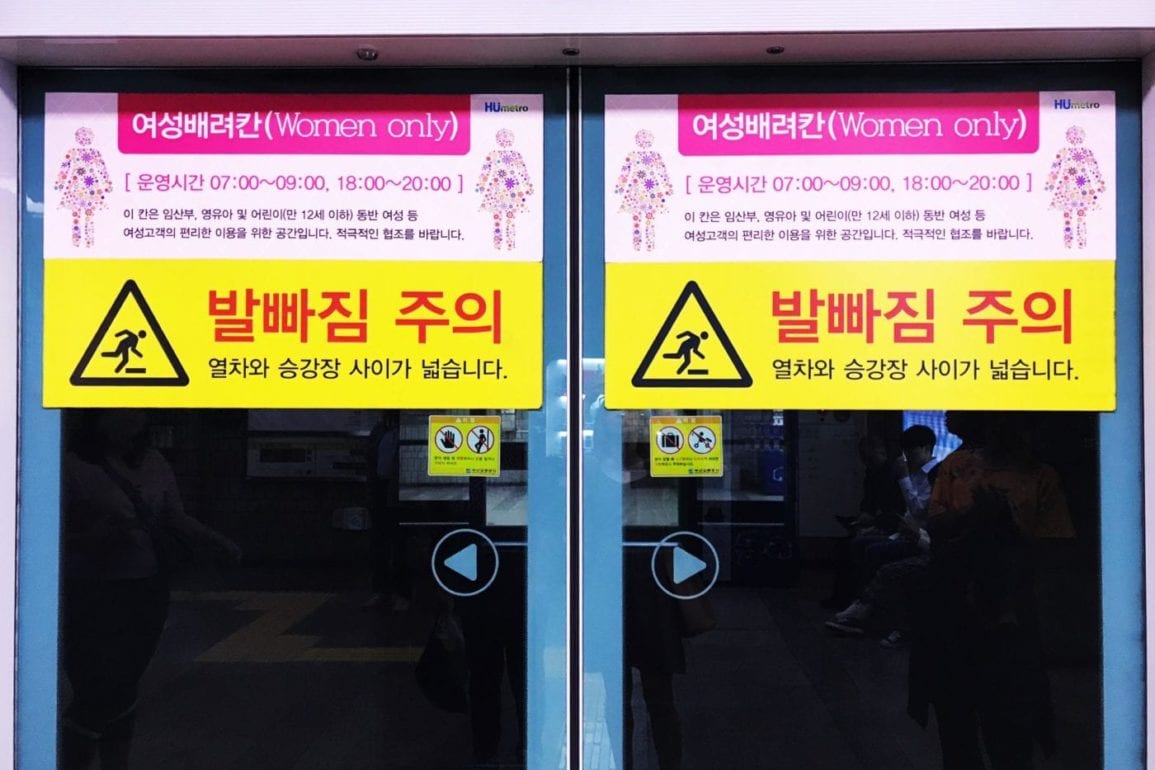In the wake of the #MeToo movement and a government crackdown on spycam porn, Korea has turned its attention toward the thousands of sexual assault and harassment cases that go under the radar. A chunk of those assaults
The Seoul Metro and Seoul Metropolitan Rapid Transit Corporation have already tried women-only subway cars twice, only to retreat thanks to backlash. After the launch, they were accused of promoting sexism toward men and victim blaming toward women.
In 2016, the Busan Transport Corporation gave women-only subway cars another shot, pasting pink signs all over Busan’s stations. These signs still remain, but the effectiveness of women-only subway cars is unknown. It is also unclear whether Seoul Metro will test-run them again in Korea’s public transport mecca.
We took a closer look at the what, where and why not questions surrounding women-only subway cars, and spoke to a Busan local to get a firsthand look into the combat against sexual violence.
Why the Need for Women-only Cars?
In 2017, 1,094 sexual assault crimes were reported on Seoul’s metro, a 30% increase from the last two years. These women have been the subject of volatile behaviour, including uncomfortable staring, having their hair sniffed, having their bodies inappropriately touched, verbal abuse, physical abuse and being followed after leaving the subway.
This past year the #MeToo movement has gained dynamic speed, as well as protests exposing the use of spycams. Korea has responded in a number of ways with the introduction of female-first parking spaces located closer to shopping centers, “scream detectors” in public bathrooms, CCTV saturated areas on subway platforms and an app called “지하철안전지킴이” (Subway Safekeeper), which allows passengers to report assaults and/or harassment. They’ve also put in place posters with warnings and emergency contacts.
However, nothing has been said about the comeback of the pink passenger cars in Seoul.
Are Women-only Cars Effective?
The main question is whether the subway carriages will prove successful, despite the second round of recalls. As for Busan, mixed opinions still keep the locals at odds with the cars, but some women seem grateful for their introduction.
Kim Chae-yun, a university student studying in Busan, expressed that the subway cars give her the peace of mind she needs to travel safely. “I feel comfortable,” Kim told 10 Magazine. “Because when I sit [in normal carriages] I always feel like I have to touch with a man’s body unnecessarily. But when I’m in the women-only carriage there is more room and I do not have to touch anyone.
“I have seen many women use it. I think young women prefer to ride in there.”
While young men seemingly comply with the specific times designated to females riding the carriages, some are not as open to the idea. “When men realize that they are in woman carriage they transfer to other carriage,” Kim said. “But some men who are older than 40 don’t care at all.”

Backlash to Women-only Subway Cars?
Despite the rise in reports of sexual assault, female-only carriages are still exclusive to Busan. These pink subway cars have been under scrutiny since their introduction in 2016, namely for not targeting the source of the problem with a crackdown through law and education.
“We believe that separating women and men won’t solve the fundamentals of the problem,” said Korea Sexual Violence Relief Center’s Lee Seon-mi. “To really tackle the problem, you need to understand the crimes. General education is more important.”
Korean women have expressed concerns that by making a space reserved for females, those who aren’t in the car at the time of their assault will be blamed.
“This can make people misunderstand that women who don’t ride in the designated cars are fine with sexual harassment,” one netizen said, via The Korea Bizwire. “And if this harassment does occur, there may be situations in which women take the blame for not using the designated cars.”
On the other hand, men have also started to fear being wrongfully accused for assaulting women, especially during the mayhem of Seoul’s peak hour. Even so, the carriages have not been able to settle these fears as they are overshadowed by the concerns that they fuel reverse discrimination toward male commuters.
Should Seoul Implement Women-only Cars?
In past attempts, Seoul has tried a number of various approaches to get the women-only zones working. Seoul Metro has changed the designated time, from typical rush hours to the last subway car of the day only. They also changed the name from “women-only” cars to “women-safety” cars in their 2011 stint. Still, the criticism remained stagnant.
However, 2019 is a new world for the Korean feminism movement, which although unpopular, has brought attention to the plights of women in Korea. Considering the government’s crackdown on spycam issues, in this new context we question whether the cars will be more widely supported if brought back now or face the same hostile response.




